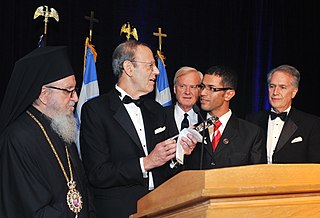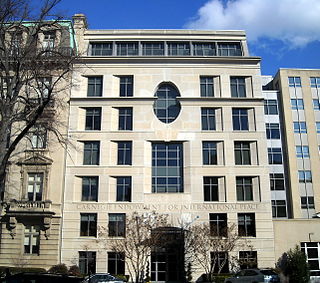Related Research Articles

The National Endowment for Democracy (NED) is a quasi-autonomous non-governmental organization in the United States founded in 1983 with the stated aim of advancing democracy worldwide, by promoting political and economic institutions, such as political groups, trade unions, free markets, and business groups.

The Carnegie Endowment for International Peace (CEIP) is a nonpartisan international affairs think tank headquartered in Washington, D.C., with operations in Europe, South Asia, East Asia, and the Middle East, as well as the United States. Founded in 1910 by Andrew Carnegie, the organization describes itself as being dedicated to advancing cooperation between countries, reducing global conflict, and promoting active international engagement between the United States and countries around the world. It engages leaders from multiple sectors and across the political spectrum.

Winston Lord is a retired American diplomat. As Special Assistant to the National Security Advisor and then as Director of Policy Planning at the United States Department of State, Lord was a close adviser to Henry A. Kissinger and was instrumental in bringing about the renormalization of U.S.-China relations in the 1970s.

Robert Kagan is an American columnist and political scientist. He is a neoconservative scholar. He is a critic of U.S. foreign policy and a leading advocate of liberal interventionism.
The Republican Party in the United States includes several factions, or wings. During the 19th century, Republican factions included the Half-Breeds, who supported civil service reform; the Radical Republicans, who advocated the immediate and total abolition of slavery, and later advocated civil rights for freed slaves during the Reconstruction era; and the Stalwarts, who supported machine politics.

Robert Anthony Pape is an American political scientist who studies national and international security affairs, with a focus on air power, American and international political violence, social media propaganda, and terrorism. He is currently a professor of political science at the University of Chicago and founder and director of the Chicago Project on Security and Threats (CPOST).

Timothy David Snyder is an American historian specializing in the history of Central and Eastern Europe, the Soviet Union, and the Holocaust. He is the Richard C. Levin Professor of History at Yale University and a permanent fellow at the Institute for Human Sciences in Vienna.

The 2000s in Algeria emerged from the 'Black Decade' of the 1990s. The 'Black Decade' was characterised by a civil war beginning in 1991 and ending at the beginning of the following decade in 2002. President Abdelaziz Bouteflika, who is accredited with ending the civil war, continued to be in power throughout the 2000s following his election in 1999. Despite being in power for 20 years and being Algeria's longest running president, Bouteflika's politics have been widely opposed and contested, with accusations from the BBC “of widespread corruption and state repression”. In April 2019 Bouteflika officially resigned from his position as president after months of public protest and loss of the army's support. The 82 Year old President was widely considered unfit for the role after experiencing a stroke in 2013. His resignation was reported by the BBC to have been met with "huge celebrations".
The Truman National Security Project is a United States national security and leadership development organization based in Washington, D.C. The Truman Project's stated mission is to develop smart national security solutions that reinforce strong, equitable, effective, and nonpartisan American global leadership. It says its network includes 2,000 veterans, frontline civilians, policy experts, and political professionals. The organization is named after former U.S. President Harry S. Truman. It was founded in 2004 by international relations scholars Rachel Kleinfeld and Matthew Spence.

Morton Isaac Abramowitz is an American diplomat and former U.S. State Department official. Starting his overseas career in Taipei, Taiwan after joining the foreign service, he served as U.S. Ambassador to Thailand and Turkey and as the Assistant Secretary of State for Intelligence and Research. He retired from the State Department with the rank of Career Ambassador. He then became president of the Carnegie Endowment for International Peace and founded the International Crisis Group.
Thomas Carothers is an American lawyer and international relations scholar. His research focuses on international democracy support, democratization, and U.S. foreign policy. He is a senior fellow at the Carnegie Endowment for International Peace, where he founded and currently co-directs the Democracy, Conflict, and Governance Program. He has also taught at several universities in the U.S. and Europe, including Central European University, the Johns Hopkins School of Advanced International Studies, and Nuffield College, Oxford.
Paul Thomas Haenle is an American analyst and China specialist currently serving as Maurice R. Greenberg Director’s Chair at the Carnegie Endowment for International Peace.
The Cambodian Constituent Assembly was a body elected in 1993 to draft a constitution for Cambodia as provided in the 1991 Paris Peace Agreements. The writing of the Cambodian Constitution took place between June and September 1993 and it resulted in the transformation of the political situation of Cambodia from civil-war-marred, autocratic oligarchy to a constitutional monarchy. Achieved under the guidance, auspices and funding of the United Nations Transitional Authority in Cambodia (UNTAC), the drafting of the constitution was the culmination of a larger, $1.6 billion effort to end the decades-old country’s civil wars and bring the warring parties into political, rather than military competition. The result of the process was the creation of a constitution for Cambodia that, at least on paper, guarantees free political competition, regular elections, equal rights and representation and universal suffrage.

Jacob Jeremiah Sullivan is an American attorney serving since 2021 as the U.S. National Security Advisor. He previously served as Director of Policy to President Barack Obama, National Security Advisor to then-Vice President Biden and Deputy Chief of Staff to Secretary Hillary Clinton at the U.S. Department of State. Sullivan also served as senior advisor to the U.S. federal government at the Iran nuclear negotiations and senior policy advisor to Clinton's 2016 presidential campaign, as well as visiting professor at Yale Law School. On November 23, 2020, President-elect Biden announced that Sullivan would be appointed the United States National Security Advisor. He took office on January 20, 2021.
Elizabeth Neumann is an American former homeland security official. In the Trump administration she served from February 2017 to April 2020 as a senior advisor and Deputy Chief of Staff of the Department of Homeland Security (DHS) to DHS Secretary John Kelly and Acting DHS Secretary Elaine Duke, and as DHS Assistant Secretary for Threat Prevention and Security Policy to DHS Secretary Kirstjen Nielsen, Acting DHS Secretary Kevin McAleenan, and Acting DHS Secretary Chad Wolf. She served on the Homeland Security Council staff in the George W. Bush administration starting in 2003.
Stochastic terrorism is a form of political violence instigated by hostile public rhetoric directed at a group or an individual. Unlike incitement to terrorism, stochastic terrorism is accomplished with indirect, vague or coded language, which grants the instigator plausible deniability for any associated violence. A key element of stochastic terrorism is the use of media for propagation, where the person carrying out the violence may not have direct connection to any other users of violent rhetoric.
Protect Democracy is a nonprofit organization based in the United States. A nonpartisan group, Protect Democracy seeks to check what it believes are authoritarian attacks on U.S. democracy.

Democratic backsliding in the United States has been identified as a trend at the state and national levels in various indices and analyses. Democratic backsliding is "a process of regime change towards autocracy that makes the exercise of political power more arbitrary and repressive and that restricts the space for public contestation and political participation in the process of government selection".

Matthew Spence is an American lawyer, international relations scholar, and former senior defense official currently serving as Managing Director of Guggenheim Partners, focusing on issues related to security and technology.
Evan A. Feigenbaum is an American political scientist currently serving as vice president for studies at the Carnegie Endowment for International Peace. He was the U.S. Deputy Assistant Secretary of State for South and Central Asian Affairs from 2006 to 2009 during the George W. Bush administration.
References
- 1 2 3 "Rachel Kleinfeld". Carnegie Endowment for International Peace . Retrieved March 22, 2024.
- ↑ Sargent, Greg (2022-07-11). "Opinion | An expert in political violence urgently warns: The worst is coming". Washington Post. ISSN 0190-8286 . Retrieved 2024-03-23.
- ↑ "Marking Jan. 6 anniversary, Biden warns political violence poses grave threat to democracy". PBS NewsHour. 2024-01-05. Retrieved 2024-03-22.
- ↑ "Is America entering a new era of political violence?". The Economist. ISSN 0013-0613 . Retrieved 2024-03-23.
- ↑ "Board of Directors - NATIONAL ENDOWMENT FOR DEMOCRACY". 2024-03-05. Archived from the original on 2024-03-05. Retrieved 2024-03-23.
{{cite web}}: CS1 maint: bot: original URL status unknown (link) - ↑ "Board & Leadership". Freedom House. Retrieved 2024-03-23.
- ↑ "Three Yale Students Chosen as Rhodes Scholars". YaleNews. 1999-12-06. Retrieved 2024-03-23.
- ↑ "The Truman National Security Project | History". www.trumanproject.org. Retrieved 2024-03-23.
- ↑ "40 Under 40 - TIME". Time. 2010-10-14. ISSN 0040-781X . Retrieved 2024-03-23.
- ↑ Kleinfeld, Rachel (2018). A savage order: how the world's deadliest countries can forge a path to security (First ed.). New York: Pantheon Books. ISBN 978-1-101-87199-7.
- ↑ Kleinfeld, Rachel (2012). Advancing the rule of law abroad: next generation reform. Washington, D.C: Carnegie Endowment for International Peace. ISBN 978-0-87003-349-0.
- ↑ Kleinfeld, Rachel; Sloan, Drew (December 7, 2011). Let there be light: electrifying the developing world with markets and distributed energy. Washington, D.C: Truman National Security Institute. ISBN 978-0-692-01563-6.
- ↑ Kleinfeld, Rachel (2024-07-19). "The Rising Tide of Political Violence". Foreign Affairs. ISSN 0015-7120 . Retrieved 2024-07-19.
- ↑ Kleinfeld, Rachel; Holt, Jared (2024-02-09). "There won't be another Jan. 6 now, no matter what happens to Trump". The Hill. Retrieved 2024-03-23.
- ↑ Lydgate, Rachel Kleinfeld and Joanna (2023-06-19). "Have pro-Trump extremists finally gotten the message about political violence?". The Hill. Retrieved 2024-03-23.
- ↑ Kleinfeld, Rachel (November 7, 2022). "Opinion | How Political Violence Went Mainstream on the Right". Politico . Retrieved March 22, 2024.
- ↑ "The Rise of Political Violence in the United States". Journal of Democracy. Retrieved 2024-03-23.